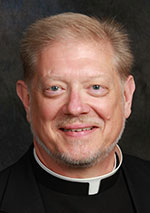That All May Be One / Fr. Rick Ginther
Faith must be at the heart of what we believe
 Why would anyone want to pray for what they perceive is impossible?
Why would anyone want to pray for what they perceive is impossible?
The Gospel of Luke, in the person of the Archangel Gabriel, states that “nothing is impossible for God” (Lk 1:37).
Is greater faith needed to pursue in prayer that which seems impossible?
Or is a greater openness needed to whatever answer God brings?
God may provide an answer to the impossible, but the response just might not be what we had imagined it “should” be. Which leaves us again with a requirement for greater faith.
We are in the midst of the Week of Prayer for Christian Unity, which this year is on Jan. 18-25. Since 1908, first in the U.S. and subsequently throughout the world, many Christians have annually prayed for unity. That’s 114 years of concentrated prayer! And still, we remain “not as one.”
Some might say, as solace, that disunity is more than 1,000 years old. The “Great Schism” between East and West came about in 1054. The cause: a complex mix of religious disagreements, political conflicts and cultural and linguistic differences.
Some might point out that the Protestant Reformation (1521) is 500 years old. It, too, is a complex mix of religious disagreements and political conflicts.
Such solace would be grounded in the fact that the tearing apart has greater longevity than the praying for unity.
But this is hollow solace, at best. Such solace is centered upon numbers of years, not hope.
Ecumenical progress, spawning from 1908 to the present, is notable.
A World Council of Churches exists. The Pontifical Council for the Promotion of Christian Unity exists. The latter is an observer at the former. The two cooperate in producing the Week of Prayer for Christian Unity prayer and reflection resources.
As past columns of “That All May Be One” attest, international, regional and national dialogues exist and thrive.
A mutual respect in and through our common Christ continues to grow.
Popes engage with patriarchs and other worldwide Christian leaders. Mutual anathemas have been rescinded, and joint declarations have become more common. So much in 114 years! And yet…
The Eastern Orthodox struggle to relate peaceably among themselves, let alone with the Roman Catholic Church.
The ecclesial communities of the Reformation, though in dialogue one with another and with the Catholic Church, have much work to do. How do they bridge certain questions of valid orders, eucharistic presence, apostolic succession and papal authority to a common answer?
Still, other Christian or quasi-Christian denominations will have nothing to do with some or all other Christian denominations.
Pope Francis has written that the pursuit of Christian unity is not a destination but a journey. The actual journey is what is essential. The end point of the journey has not been revealed, nor can it be named with clarity. But journey, he insists, we must!
We pray for our eternal salvation. “Holy Mary, Mother of God, pray for us sinners, now and at the hour of our death. Amen.”
We believe through joyful hope that our death leads to heaven.
We vaguely describe heaven as union with God in the beatific vision. But we do not actually know what heaven looks like, nor do we know from our earthly reality how to describe union with God.
But we pray, nonetheless. We have faith that God’s promise in Jesus Christ will be fulfilled.
Perhaps the key to motivate our prayer for unity is respect for the goodness of the other through relationship. Relationships are not impossible. They just require good will and hard work.
In the end, it is possible that our prayer for unity be rooted in a prayer that asks the Spirit of God to change our hearts—impossibly frozen or rigid in despair that all could never be one.
(Father Rick Ginther is director of the archdiocesan Office of Ecumenism and Interreligious Affairs. He is also the pastor of Our Lady of Lourdes Parish, Indianapolis.) †
 Why would anyone want to pray for what they perceive is impossible?
Why would anyone want to pray for what they perceive is impossible?